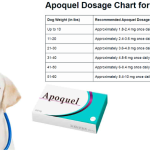As pet owners, we always strive to ensure the safety and wellness of our furry friends. When it comes to treating allergies in dogs, Cytopoint has become a popular medication in recent years. While it can help manage allergic reactions in dogs, it is important to understand the potential side effects that may arise from its use.
Comprehensive information about Cytopoint for dogs’ side effects is crucial to making informed decisions about your pet’s health. Being aware of these side effects can help you identify any potential problems and seek veterinary assistance when necessary.
Key Takeaways
- Cytopoint is a popular medication for managing allergies in dogs.
- It is important to be aware of the potential side effects of Cytopoint for dogs to ensure their safety and wellness.
- Seeking veterinary guidance and monitoring any adverse reactions is crucial when using Cytopoint for dogs.
What is Cytopoint for Dogs?
Cytopoint is a revolutionary dog allergy injection that aims to alleviate itching and scratching in dogs with allergic reactions. The injection is designed to block the natural allergy proteins that cause itching and scratching, providing long-term relief without the use of steroids.
The active ingredient in Cytopoint is lokivetmab, a monoclonal antibody that seeks out and neutralizes the protein that triggers the allergic reaction in dogs. This approach is unique in that it does not suppress the immune system, but rather targets the exact reaction that causes itching, redness, and skin irritation in dogs.
The effectiveness of Cytopoint in treating dogs with allergies is well documented, with clinical studies showing up to 80% improvement in symptoms after a single injection. It is also considered a safe treatment option with minimal side effects compared to traditional allergy treatments.
What Makes Cytopoint Different from Other Allergy Treatments?
One of the biggest advantages of Cytopoint is that it provides long-term relief without the need for daily medication or constant vet visits. While other allergy medications like antihistamines and corticosteroids may provide temporary relief, they often come with significant side effects and are not suitable for prolonged use.
Cytopoint is also a targeted treatment that does not interfere with the dog’s immune system, making it safer and more effective for long-term use.
However, it is important to note that like any medication, Cytopoint may come with potential side effects. Pet owners should be aware of these side effects and work closely with their veterinarian to ensure the overall safety and wellness of their dogs.
The following sections will delve deeper into the potential side effects of Cytopoint for dogs, providing comprehensive information to help pet owners make informed decisions about their dog’s health and well-being.
Common Side Effects of Cytopoint for Dogs
Cytopoint has become a popular treatment option for dogs suffering from allergic reactions. However, as with any medication, there are potential side effects to be aware of. Understanding the common side effects can help pet owners identify any issues and seek veterinary attention when necessary.
While Cytopoint is generally considered safe, some dogs may experience the following side effects after receiving the injection:
| Side Effect DescriptionRedness | |
|---|---|
| ss and Swelling at Injection Site | Some dogs may experience redness, swelling, or mild discomfort at the site of the injection. These symptoms are usually mild and temporary, resolving within a day or two. |
| Vomiting and Diarrhea | While uncommon, some dogs may experience vomiting and diarrhea after receiving Cytopoint. These symptoms usually resolve on their own within a day or two. |
| Lethargy and Loss of Appetite Some | e dogs may experience lethargy and loss of appetite after receiving Cytopoint. These symptoms are usually mild and resolve within a day or two. |
If your dog experiences any of these common side effects, it is important to monitor them closely and contact your veterinarian if the symptoms persist or worsen.
It is worth noting that some side effects may not be immediately apparent after the injection. Some dogs may experience an allergic reaction within a few hours to a few days after receiving Cytopoint. These symptoms can include hives, swelling of the face or body, difficulty breathing, and collapse. If you notice any of these symptoms, seek veterinary care immediately.
In summary, while Cytopoint is considered a safe and effective treatment for allergic reactions in dogs, it is important to be aware of potential side effects. By monitoring your dog closely and seeking veterinary attention when necessary, you can ensure their continued health and wellness.
Adverse Effects of Cytopoint on Dogs
While Cytopoint is generally considered a safe medication for dogs, there are instances where adverse effects may occur. Adverse effects are defined as any unexpected or harmful reactions to the medication, with varying degrees of severity.
It is important to note that adverse effects are not the same as common side effects, which are typically mild and temporary. Adverse effects are less common but may require veterinary attention.
Some of the adverse effects that may arise from Cytopoint treatment in dogs include:
| Adverse Effects | Description |
|---|---|
| Anaphylaxis | A severe and potentially life-threatening allergic reaction that can cause difficulty breathing, swelling of the face and throat, and collapse. This is a rare adverse effect, but it can occur in some dogs. |
| Increased susceptibility to infections | Dogs receiving Cytopoint may experience a slightly higher risk of developing infections due to the medication’s effects on the immune system. |
| Digestive upsets | Some dogs may experience vomiting, diarrhea, or stomach pain as an adverse effect of Cytopoint treatment. |
| Lethargy | A few dogs may experience lethargy or a general feeling of being unwell after Cytopoint injections. |
| Muscle pain | In rare cases, dogs may experience muscle pain or stiffness as an adverse effect of Cytopoint injections. |
If your dog experiences any adverse effects after receiving Cytopoint treatment, it is important to seek veterinary care immediately. Your veterinarian will be able to assess the severity of the reaction and provide appropriate treatment.
As with any medication, it is essential to monitor your dog closely for any adverse effects and consult with your veterinarian if you have any concerns.
Long-Term Side Effects of Cytopoint in Dogs
Cytopoint for dogs can provide relief from the symptoms of allergic reactions, but it is important to consider the potential long-term side effects of this treatment. While Cytopoint is generally well-tolerated and considered safe for use, repeated use may lead to some unintended consequences.
Dogs receiving Cytopoint injections should be monitored regularly for any signs of long-term side effects. Some potential issues that may arise include:
| Potential Long-Term Side Effects of Cytopoint in Dogs |
|---|
| Increased susceptibility to infections |
| Development of cancer decreased |
| d effectiveness over time immune |
| e system suppression |
While these side effects are rare, it is important to work with your veterinarian to monitor your dog’s health and ensure that any issues are addressed promptly. Remember to report any changes in behavior or physical symptoms to your veterinarian, as they can be indicative of a larger problem.
If you have any concerns about the potential long-term side effects of Cytopoint in dogs, do not hesitate to discuss them with your veterinarian. They can provide the best guidance and advice on how to ensure the safety and well-being of your pet.
Common Allergies Treated with Cytopoint and its Side Effects
Cytopoint is a medication commonly used to manage allergic reactions in dogs. It is specifically designed to target and neutralize the cytokines that trigger itching and inflammation in dogs with allergies. The treatment is recommended for dogs with atopic dermatitis or other allergies that cause persistent itching or skin infections.
While Cytopoint can be an effective treatment for managing allergies, it is important to be aware of the potential side effects that may arise from its use. Some common side effects associated with Cytopoint treatment for specific allergies may include:
| Allergies | Common Side Effects |
|---|---|
| Atopic dermatitis | Infection at the injection site, vomiting, diarrhea, lethargy, itching, and redness |
| Food allergies | Swelling at the injection site, vomiting, diarrhea, lethargy, and itching |
| Environmental allergies | Injection site reactions, lethargy, and itching |
If your dog is receiving Cytopoint treatment for allergies, it is important to monitor for any adverse reactions or side effects and consult with your veterinarian if any concerns arise. Your veterinarian may recommend additional medications or treatments to address any side effects your dog experiences.
Overall, understanding the potential side effects of Cytopoint for dogs and being vigilant in monitoring your pet’s reactions can help ensure their safety and wellness throughout treatment.
Cytopoint Injection Side Effects in Dogs
While Cytopoint is generally well-tolerated by dogs, there are some potential side effects that pet owners should be aware of. In particular, the injection process itself may cause some discomfort or reactions in dogs.
After receiving a Cytopoint injection, dogs may experience mild pain, swelling, or redness at the injection site. In some cases, they may also display signs of itchiness or scratching at the area.
In rare cases, dogs may experience more severe reactions to the injection, such as hives, vomiting, or diarrhea. If you notice any of these symptoms in your dog after they receive a Cytopoint injection, it’s important to contact your veterinarian right away.
It’s also worth noting that some dogs may experience a mild allergic reaction to the injection itself, which could manifest in symptoms such as facial swelling, hives, or difficulty breathing. In such cases, immediate veterinary attention is essential.
If you’re concerned about the potential injection side effects of Cytopoint in your dog, it’s important to discuss these risks with your veterinarian. They can help you weigh the benefits of this treatment against the possible side effects and determine whether it’s the right choice for your furry friend.
Side Effects of Cytopoint Treatment
Cytopoint is a popular treatment for dogs suffering from allergies, and it is essential to be aware of the possible side effects that may arise during treatment. While the medication is generally safe, some dogs may experience side effects that range from mild discomfort to more severe reactions.
Common side effects of Cytopoint in dogs may include:
- Vomiting
- Diarrhea
- Lethargy
- Decreased appetite
In rare cases, a dog may experience more severe side effects such as an allergic reaction, which may include symptoms such as:
- Swelling of the face, throat, or tongue
- Difficulty breathing
- Hives or rashes
- Weakness or collapse
If you notice any of these symptoms in your dog after receiving a Cytopoint injection, seek veterinary attention immediately.
It is also important to observe your dog for any long-term side effects that may arise from repeated treatment. While Cytopoint is safe for long-term use, some dogs may develop adverse reactions over time, including:
- Skin infections
- Urinary tract infections
- Ear infections
- Change in behavior
If you notice any of these symptoms in your dog, contact your veterinarian for guidance.
Remember, it is essential to seek veterinary guidance whenever you are administering any medication to your dog. Your veterinarian can help you understand the potential side effects of Cytopoint and how to manage any adverse reactions that may occur during treatment.
Ensuring Your Dog’s Safety and Wellness
As a responsible pet owner, it is essential to be aware of the potential side effects of Cytopoint for dogs. To ensure the overall safety and wellness of pets undergoing this treatment, there are several measures that you should take into account.
Regular Veterinary Check-ups
Firstly, it is crucial to maintain regular veterinary check-ups throughout Cytopoint treatment for your dog. Your veterinarian will monitor your pet’s progress and any potential side effects that may arise during treatment. These check-ups will allow early detection of any issues and timely resolution.
Open Communication with Your Veterinarian
You should also ensure open communication with your veterinarian, sharing any concerns or observations that you may have regarding your dog’s health and behavior. This communication will enable prompt identification of any warning signs or adverse reactions, leading to more effective treatment and management of any side effects.
Monitoring for Adverse Reactions and Side Effects
Lastly, it is essential to monitor your dog for any adverse reactions or side effects, especially during the first few days following treatment. These may include changes in appetite, lethargy, vomiting, or diarrhea, among others. If you observe any such signs, you should immediately consult your veterinarian, who will provide the necessary guidance and advice.
By following these measures, you can ensure the overall safety and wellness of your dog undergoing Cytopoint treatment, while minimizing the potential side effects that may arise. Remember that early detection and timely intervention are critical to successful treatment, and always consult your veterinarian if you have any concerns regarding your pet’s health.
Conclusion
In conclusion, understanding the potential side effects of Cytopoint for dogs is crucial for ensuring the safety and wellness of pets. While Cytopoint can be an effective treatment for allergies in dogs, it is important to monitor for any adverse reactions or side effects that may occur during treatment.
Pet owners should be aware of the common and adverse side effects that may arise from Cytopoint injections, as well as the long-term effects of prolonged treatment. Open communication with a veterinarian and regular check-ups can help ensure that any side effects are identified and managed promptly.
Overall, if you are considering Cytopoint for your dog’s allergy treatment, it is important to consult with your veterinarian, monitor for any potential side effects, and prioritize your pet’s safety and wellness above all else. Stay informed, stay vigilant, and prioritize your dog’s health and happiness above all else.










